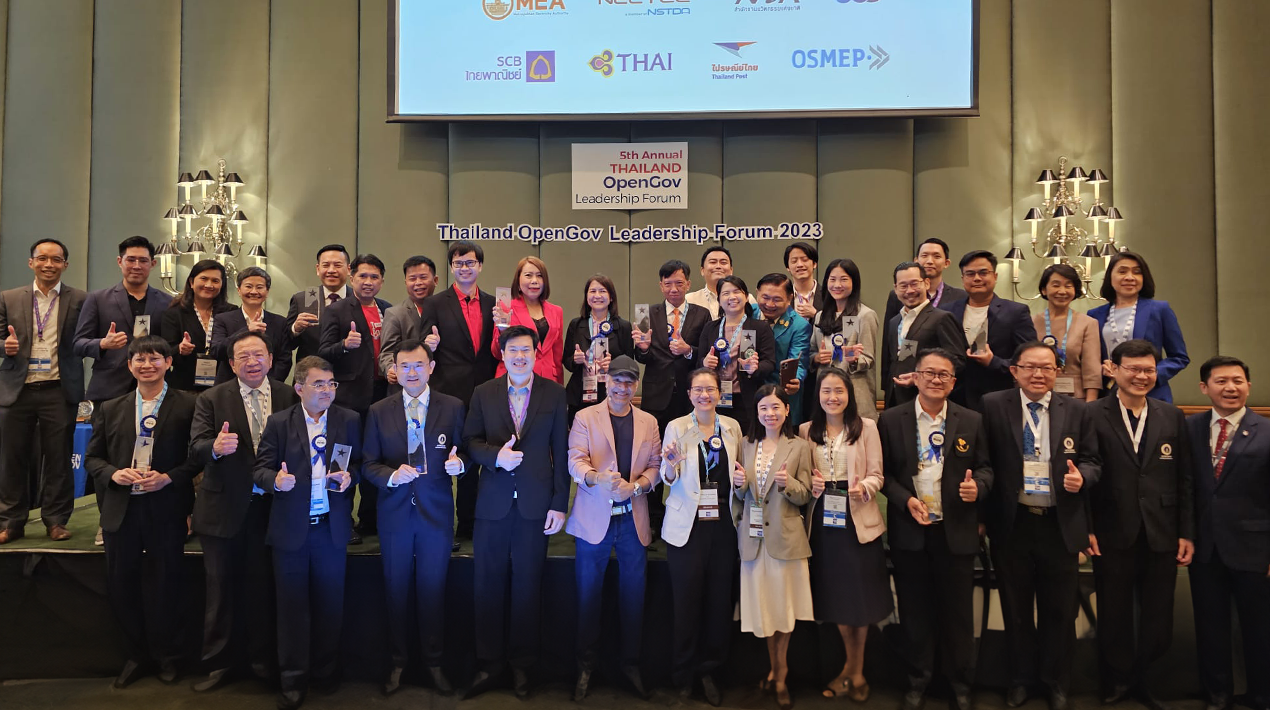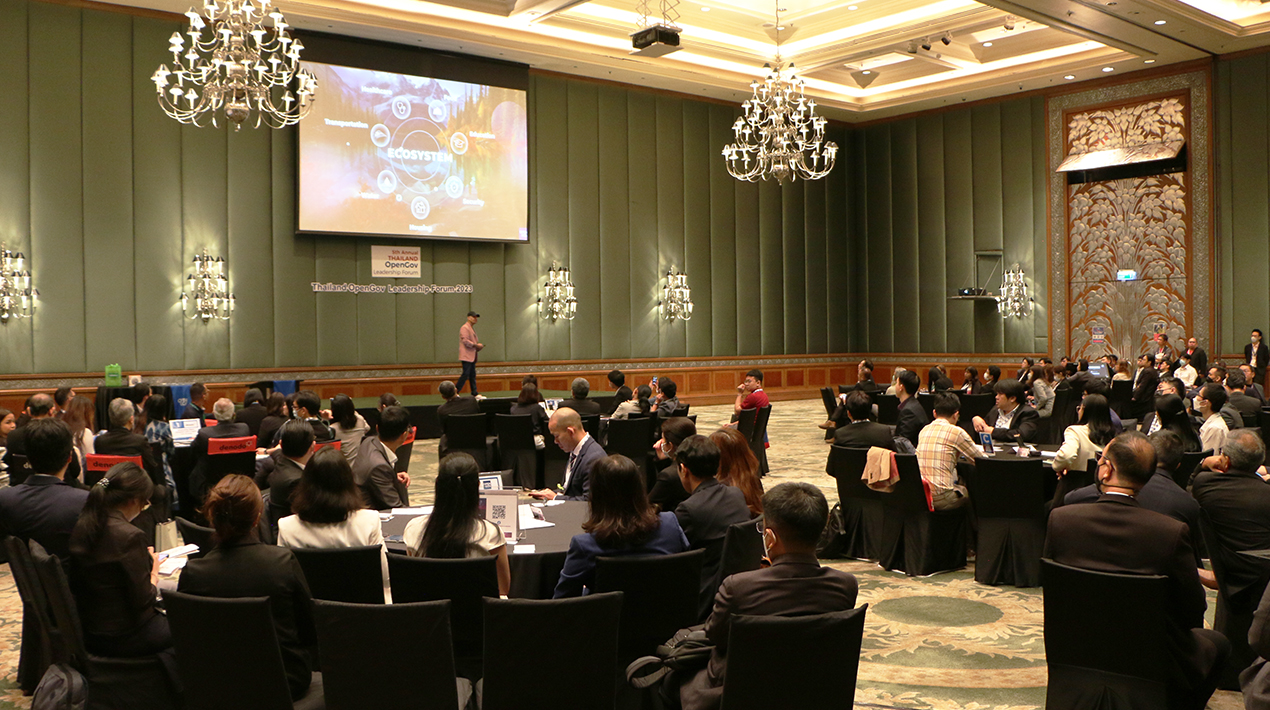
|
Getting your Trinity Audio player ready...
|
The development of digital transformation is nothing new in the modern era. In recent decades, technology has changed the way people work, communicate and live. Breakthroughs in computing, the internet, and mobile devices have brought major changes in almost all aspects of human life.
In Thailand, digital transformation has also significantly impacted the world of government and governance. In providing public services, government institutions have adopted digital 4.0 technology to increase service efficiency and safeguard public data and bureaucratic efficiency. Data analytics, artificial intelligence (AI), and the Internet of Things (IoT) have opened up new opportunities in government governance and making better decisions in determining policies objectively.
However, the Thai government has become increasingly aware of the fact that progress in digital transformation is not limited to improving public services alone. They have recognised the enormous potential contained in digital transformation to significantly improve the national economy. This awareness emerged in response to the country’s experience in dealing with the impact of the pandemic in the past.
Previous critical events have taught many valuable lessons about the importance of adapting to uncertain and rapidly changing situations. Therefore, the Thai government sees digital transformation as one way to build better economic resilience amid such challenges.
Through digital technology and innovation, the nation is optimistic that they can stimulate economic growth, create new jobs and reduce the negative impact of crises that may occur in the future. In this way, digital transformation is not just about providing better services to society, but also about ensuring sustainability and economic prosperity for the country as a whole.
For example, Thailand needs to prepare for upcoming AI technology and develop AI capabilities within the country to maximise the benefits of the plan. As progress in AI technology accelerates around the world, Thailand recognises the importance of having a strong technological foundation in this field. They want to ensure that the country is not only a user of AI technology, but also can actively develop it.
In light of this, Thailand has initiated serious efforts to develop an inclusive and competitive AI ecosystem and encourage collaboration between the private sector, government and institutions. With consistency and commitment to advancing digitalisation, Thailand will be able to become a pioneer of digital hubs in ASEAN.
The Thailand OpenGov Leadership Forum on 5 October 2023 at the Grand Hyatt Erawan Bangkok brought together technology leaders and digital technology institutions in Thailand to discuss digital transformation 4.0 in Thailand.
They delved into the endeavours of Thailand’s public sector aimed at advancing digital transformation. This included initiatives spanning workforce augmentation, enhancements in digital infrastructure, the cultivation of digital policy expertise, and bolstering data privacy and security measures.
Opening Remarks

Mohit Sagar, the CEO & Editor-in-Chief of OpenGov Asia, highlights that Thailand is on a transformative path called “Thailand 4.0” in its quest for economic prosperity and societal welfare. This visionary endeavour aims to cultivate an economy rooted in values, fostering innovation, technology, and creativity to propel the country to the forefront of global advancement.
At the heart of Thailand 4.0 lies a commitment to adaptability and inclusivity, says Mohit. The nation recognises the importance of staying ahead of changing trends and emerging as a leader in various sectors. Key areas of focus include robotics, digital industry, aviation, logistics, and biofuels, all of which demonstrate a strong dedication to driving economic development.
Thailand’s vision for the future is firmly rooted in the premise that each of its citizens plays a pivotal role in advancing collective prosperity. This vision has given birth to “Thais 4.0,” a transformative movement characterised by a commitment to competence, resilience, and adaptability. By implementing educational reforms, fostering skills development programmes, and embracing the Refill and Reform strategy, Thailand is dedicated to equipping its people with the tools they need to excel in an interconnected and globalised world.
Mohit acknowledges that environmental sustainability is a cornerstone of Thailand 4.0. The nation is committed to protecting the environment, mitigating the impacts of climate change, and reducing its carbon footprint. By integrating environmental awareness into its economic framework, Thailand is constructing a resilient and livable society for future generations.
The government has taken concrete steps to realise the goals of Thailand 4.0. The establishment of the Eastern Economic Corridor (EEC) as a growth hub underscores the nation’s commitment to regional development and economic diversification.
The Digital Economy Promotion Agency (depa) actively fosters a digital ecosystem, catalysing innovation and technological advancement. Additionally, the government is revitalising major industries while championing emerging sectors like robotics, aviation, and biofuels, positioning Thailand as a global leader in various fields.
Within the framework of Thailand 4.0, there are four pivotal agendas.
Firstly, “Preparing Thais 4.0 for First-World Status” underscores Thailand’s commitment to preparing its citizens for the future by instituting reforms in the education system and fostering skills development. This empowers individuals to actively contribute to the nation’s journey toward achieving first-world status.
Secondly, “Developing Technology Clusters and Future Industries” showcases Thailand’s resolute determination to nurture ten Future Industries, including robotics, aviation, digital innovation, and biofuels. This strategic approach positions the nation as a forefront leader in 21st-century technology.
Thirdly, “Fostering Innovation-Driven Entrepreneurship” places significant emphasis on Thailand’s support for the transformation of small and medium-sized enterprises (SMEs) into “Smart SMEs.” It also promotes high-value services, cultivating a culture of entrepreneurship and innovation that propels economic advancement.
Lastly, “Strengthening Internal Economy and Provincial Clusters” focuses on bolstering Thailand’s internal economy and regional innovation through the development of 18 provincial clusters, exemplified by the concept of “Province 4.0.” This underscores the nation’s dedication to achieving balanced and inclusive development across its regions.
“Thailand’s role as a trading nation and an Asian business hub is set to grow,” Mohit observes. “The nation is committed to economic integration within Cambodia, Laos, Myanmar, Vietnam and Thailand (CLMVT) context and embracing international business models of the 21st century.”
Thailand 4.0 represents a visionary path toward inclusive progress and innovation. With a steadfast commitment to adaptability, environmental sustainability, and societal well-being, Thailand is poised to make significant strides on the global stage.
“Through these concerted efforts, Thailand’s journey toward becoming a values-driven, innovative economy is set to benefit every citizen and ensure a prosperous future for all,” Mohit concludes.
OPENING KEYNOTE

In his opening remarks, Dr Supot Tiarawut, President & CEO of the Digital Government Development Agency (DGA), emphasises that Thailand, endowed with abundant resources, is well-positioned to harness the potential of digital technology for development. He further discloses that Thailand has been actively pursuing initiatives aimed at fostering a more substantial and enduring transformation.
These efforts include developing strong digital infrastructure, increasing internet connectivity, developing innovation and research in the advancement of science and technology, as well as inclusive collaboration between entities to achieve accelerated progress.
“All of these are important steps towards realising Thailand’s vision as a modern and highly competitive country in the digital era,” Dr Supot explains. “Digital transformation can help improve Thailand’s economic recovery from the COVID-19 crisis as well as increase the long-term competitiveness of its businesses.”
A recent study reveals that the pandemic has accelerated the pace of the digital revolution worldwide by approximately five years. This acceleration presents Thailand with a significant opportunity to capitalise on the forthcoming digital advancements.
According to the report, if Thailand fully harnesses digital technologies within its economy, by the year 2030, these technologies have the potential to generate an annual economic value of THB 2.5 trillion (approximately S$79.5 billion). This substantial figure represents approximately 16% of Thailand’s GDP as of 2020.
Currently, according to Dr Supot, there are three priorities for Thailand in its transformation process. The first is to invest in R&D to drive technological progress, encourage innovation, create new knowledge, and develop cutting-edge technologies. This will enable Thailand to become a major player in the global technology industry and increase economic competitiveness going forward.
The second is to improve digital infrastructure to facilitate seamless connectivity, data transmission and access to digital services across the country. This includes developing an extensive broadband network, reliable telecommunications infrastructure, and increasing equitable internet access throughout the country. With a strong digital infrastructure, Thailand can ensure that its people have easy and affordable access to digital technology.
Dr Supor highlights that some of the steps that Thailand has taken to improve digital infrastructure include modernising smart agriculture by using drones for farmers. This is one example of how digital technology can be applied in the agricultural sector to increase productivity and efficiency.
Additionally, Thailand has also invested in developing a 5G network that will enable faster and more reliable connectivity with the aim of strengthening Thailand’s digital infrastructure and increasing access to digital services throughout the country.
The third priority involves encouraging increased cross-organisational collaboration, with the primary goal of addressing gaps in knowledge transfer and leveraging diverse skills, resources, and different points of view. This effort aims to promote a greater exchange of ideas and innovation and optimise the utilisation of available resources in various organisations.
Cross-organisation collaboration is key in facing complex digital transformation challenges, Dr Supot is convinced. By working together more closely, Thailand has the opportunity to maximise the potential of its digital transformation. This means not only leveraging emerging technologies but also ensuring that inclusivity and a multidisciplinary approach are the foundation of every step towards a more advanced future.
In the era of digital transformation, technological progress is certain. However, to achieve maximum results, there needs to be strong collaboration between various parties, including the private sector, government and non-profit institutions.
“Only by working together can Thailand face the complexity of emerging challenges more effectively and realise the full potential of this change,” Dr Supot concludes.
TECHNOLOGY CASE STUDY

“As we navigate the mobile and always-on world, data has emerged as a vital resource that must not only meet our expectations but also drive innovation, enhance resiliency, and anticipate threats,” says Raymond Goh, Vice President of Sales Engineering, APJ, Veeam.
Data, once considered a passive repository of information, has undergone a remarkable transformation. It has evolved into a dynamic and intelligent tool capable of providing real-time insights that empower organisations to make informed decisions and stay ahead of the curve.
One of the most significant shifts in data management is the need for information to be accessible anytime, anywhere, Raymond highlights. In a mobile-driven society, both individuals and businesses have a growing need for on-the-go data access. This requires a transition from conventional data storage approaches to more flexible cloud-based solutions. Intelligent data management facilitates secure and effortless access to data across multi-cloud systems, ensuring that crucial information is readily available whenever needed.
Besides, the evolving state of data intelligence goes beyond convenience. It plays a pivotal role in enhancing cybersecurity, Raymond believes. Data can now anticipate threats and vulnerabilities, allowing organisations to proactively defend against potential breaches. Machine learning (ML) and artificial intelligence (AI) algorithms analyse vast datasets to identify anomalous patterns and behaviour, alerting cybersecurity teams to potential risks before they escalate into full-fledged attacks.
Innovation is another domain where intelligent data management shines. By harnessing the power of data analytics and machine learning, businesses can gain deep insights into consumer behaviour, market trends, and operational efficiencies. This newfound knowledge drives innovation, enabling companies to develop products and services that cater to the evolving needs of their customers.
Resiliency is a crucial aspect of data management in the modern era. As organisations become increasingly dependent on digital infrastructure, the ability to recover swiftly from disruptions is paramount. Intelligent data management includes robust backup and disaster recovery strategies that ensure business continuity in the face of unforeseen events, such as natural disasters or cyberattacks.
“To fully embrace the era of intelligent data management, organisations must prioritise data security, invest in scalable cloud solutions, and adopt advanced analytics tools,” Raymond asserts.
Additionally, fostering a data-driven culture within the organisation is essential. This involves educating employees about the value of data, providing them with the necessary tools and training, and promoting a mindset that encourages data-driven decision-making.
According to Raymond, “The role of data in our modern world has evolved significantly.” It is no longer a passive entity but a dynamic and intelligent resource that drives innovation, enhances resiliency, and anticipates threats.
As businesses and individuals continue to rely on data for their daily operations and decision-making, the importance of intelligent data management cannot be overstated. It is the key to thriving in a mobile and always-on world, where information is not only power but also the foundation of progress and success.
TECHNOLOGY CASE STUDY

Shanmuga Sunthar, Director of Data Architecture & Chief Evangelist for the Asia Pacific (APAC) region at Denodo provided additional insight into the important role of the workforce in the progress of this digital transformation.
Firstly, it is essential for the workforce to possess a comprehensive grasp of the technologies central to digital transformation, explains Shanmuga. This entails acquiring the requisite skills and proficiency for effectively utilising and overseeing these technologies, alongside a commitment to ongoing learning to stay abreast of swift technological advancements.
However, he added, digital transformation is not just about technology alone. The workforce must also have the ability to collaborate effectively with various groups internally, including technical teams, management and other stakeholders. The ability to communicate and collaborate is important in ensuring that all parts of the organisation can move along with this digital transformation.
Shanmuga also believes that the workforce also has a role in driving technology adoption throughout the organisation. They must be able to motivate and support their colleagues in adopting the changes necessary for digital transformation. This can include training, building an innovative work culture, and developing strategies to cope with change.
“To achieve success in digital transformation, the role of the workforce must not be ignored,” says Shanmuga. “They are one of the main pillars supporting this change, and investment in developing their skills and knowledge is a must. With a skilled, informed and collaborative workforce, organisations can face the future with confidence and successfully realise their digital transformation vision.”
The initiative to increase access to digital technology in urban and rural areas of Thailand is a very important step in facing the rapid technological developments in this modern era. Digital transformation has become a key driver of economic and social development, so it is important for Thailand to ensure that the benefits of this progress are felt equally across the country, in both urban and rural areas.
Shanmuga highlights that increasing access to digital technology in urban areas can help accelerate economic growth and strengthen global competitiveness. Major cities like Bangkok have become hubs of innovation and technology, and efforts to continue advancing digital infrastructure in these cities will help create an environment that supports business growth and better job opportunities.
However, rural areas, too, have great potential to embrace and gain from digital transformation. Increasing access to digital technology in rural areas can help drive agricultural productivity, support small and medium-sized businesses and provide access to better education and health services. This can help reduce the gap between urban and rural areas, creating more equitable economic opportunities across the country.
Cross-organisational collaboration is key to overcoming gaps in knowledge transfer and resource utilisation in various regions of Thailand. Through collaboration between the public, private and community sectors, Thailand can optimise the use of diverse expertise, resources and perspectives. This will help promote greater exchange of ideas and innovation, as well as face complex challenges more effectively.
“By encouraging inclusivity and multidisciplinary collaboration, Thailand can maximise the potential of its digital transformation and ensure that its benefits are felt by all citizens, regardless of their geographic location,” Shanmuga concludes. “In this way, Thailand will be better prepared to face a future full of opportunities and challenges in a digital world that continues to develop rapidly.”
POWER TALK I
Thailand, endowed with abundant resources, a diverse demographic profile, and a robust government, has embarked on an ambitious journey to integrate technology across various sectors, with a particular focus on enhancing efficiency in service industries.

Athikom Kanchanavibhu, Executive Vice President responsible for Digital & Technology Transformation at Mitr Phol Group, emphasised that while remarkable technological advancements are underway, their true value can only be realised through inclusivity and collaborative efforts among institutions with diverse expertise.
Incorporating technology into various industrial sectors is a positive step, but digital transformation must cover all levels of society and economic sectors. This will not only create efficiency but also create greater opportunities for all parties, including small and medium businesses to grow and innovate.
Athikom emphasised that the government’s role is central to driving collaboration. Government policies and the collaboration between public and private entities play a pivotal role in moulding the digital inclusion landscape in every nation, Thailand included. To effectively foster digital inclusion and bridge the existing digital divide within Thailand, it is imperative to enhance and leverage partnerships among the government, private sector, and civil society organisations.
Partnerships between public and private parties have an important role in driving digital inclusion initiatives. The private sector can contribute through investments in broadband networks, mobile connectivity and innovative digital solutions. Collaborative efforts can also lead to the development of affordable and accessible digital tools and services designed to meet the diverse needs of the Thai population.
Civil society organisations can complement these efforts by working at the grassroots level, providing digital skills training, and raising awareness of the importance of digital literacy. They can bridge knowledge gaps and empower marginalised communities to harness the benefits of the digital world.
Athikom pointed out that when evaluating the effectiveness and success of digital initiatives, it’s essential to take into account various types of key performance metrics:
- A good level of accessibility: this includes the extent to which access to digital technology is available to various levels of society. This can be measured by looking at the number of accesses to the internet, the presence of public Wi-Fi access points, and the level of mobile device penetration in Thailand.
- The level of smooth technology adoption: this refers to the extent to which digital technology is used by society. These metrics include the number of internet users, mobile device usage, and presence on digital platforms such as social media or e-commerce.
- Broad digital literacy level: this measures the extent to which individuals can understand and use digital technology. This involves a level of digital literacy, participation in digital literacy training, and an understanding of online safety.

Dr Chalee Vorakulpipat, Principal Researcher specialising in Information Security at the National Electronic and Computer Technology Centre (NECTEC), says it’s essential to acknowledge the inevitable gaps that may arise during the implementation of digital transformation. These gaps in digital access can exacerbate inequalities in critical areas such as education, employment, and civic participation, underscoring the pressing need to tackle the digital divide. Failing to address this issue properly could lead to even more severe consequences.
Socially, unequal digital access can deepen the gap between societal groups. Communities that do not have adequate access to digital technology may be marginalised in terms of education, information, and employment opportunities. This could result in deeper social divisions and inequalities in a country.
From an economic perspective, unequal digital access can hamper overall economic growth. Many of today’s economic opportunities are connected to digital technology, including online business, e-commerce, and remote work. If the majority of society cannot access or take advantage of these opportunities due to the digital division, then national economic growth may be limited. This could hinder economic development and reduce Thailand’s competitiveness in an increasingly digitally connected global market.
Dr Chalee stresses that, through the increasing role of technology in every aspect of society, it is crucial to address digital inclusion and digital division to prevent marginalised groups from being left behind.
“I believe that promoting digital inclusion can make an important contribution to ensuring equal access to opportunities for all citizens in Thailand,” Dr Chalee says.
Digital inclusion opens the door to broader education and access to online educational resources. With access to online knowledge and training, individuals from various backgrounds can gain the skills and knowledge necessary to increase their employment opportunities.
Moreover, digital inclusion can also increase access to economic opportunities. This can create new jobs in technology and e-commerce-related sectors. Additionally, small and medium businesses that have digital access can gain a wider market share and develop more rapidly.
“Digital inclusion also opens the door to active participation in the democratic process and involvement in community affairs,” Dr Chalee concludes. “With access to information and online platforms, citizens can engage in political discussions, access government services, and participate in decisions that affect their lives.”

Theresa Mathawaphan, the Former Chief Strategy Officer at the National Innovation Agency, says that when discussing the implementation of digital inclusion, it’s crucial to recognise that the responsibility doesn’t rest solely with the government and the private sector. Communities also play a pivotal role in ensuring the success of these efforts.
One of the main aspects is public awareness about the importance of digital inclusion. Education and outreach regarding the benefits and opportunities offered by digital technology can play a big role in encouraging active community participation. This could involve digital training and awareness programmes aimed at various groups, including those in rural areas or who have limited access to technology.
People can also contribute by becoming agents of change in their community. They can help other individuals develop their digital skills, especially those less experienced in the use of technology. Collaboration between citizens in communities can strengthen digital inclusion by supporting each other and sharing knowledge.
Community engagement can also involve participating in local initiatives aimed at improving digital access in their area. Communities can play a role in technology infrastructure projects or digital training programmes at the local level.
As such, it is important to remember that digital inclusion is not the sole responsibility of the government or the private sector but is also a collective effort of society. With awareness, education and active participation from all levels of society, digital inclusion can become more effective and sustainable in Thailand.
“Achieving digital inclusion is not just about hardware and connectivity, this also involves creating an environment where everyone can participate meaningfully in the digital era,” says Theresa. “Digital inclusion is key to creating a more just and progressive society in Thailand.”
This is important because it gives every citizen an equal opportunity to access and take advantage of advances in digital technology. In an era where it plays a central role in almost all aspects, including education, work and public services, the absence of digital inclusion can lead to greater inequality.
Theresa highlighted the importance of digital inclusion which is also related to economic growth. By providing wider access to digital technology, citizens can take advantage of online business opportunities, digital-based training and remote work. This not only creates additional jobs but also increases Thailand’s competitiveness in an increasingly connected global economy.
In addition, digital inclusion helps in providing more efficient and accessible public services. With digital technology, the government can provide health, education and public administration services more efficiently, so that people can feel the benefits in their daily lives.
Further, digital inclusion also plays an important role in building a more democratic society. It allows citizens to access information, participate in political processes, and voice their opinions online. Hence, digital inclusion strengthens public participation and more inclusive decision-making in Thailand’s development.
Theresa reiterated that digital inclusion is the foundation for a more just, advanced and inclusive society in Thailand.
“By ensuring that all individuals have equal opportunities in the digital era, Thailand can achieve sustainable economic growth, better public services and more equitable social development,” she concludes.
TECHNOLOGY CASE STUDY

In the contemporary digital era, Vivek Gullapalli, the Global Chief Information Security Officer for APAC at Check Point Software Technologies, Ltd, is eager to point out the increasing significance of data protection, particularly in light of the rising threat of ransomware attacks.
These malicious infiltrations have the potential to severely disrupt businesses and institutions, often demanding substantial ransoms in exchange for the release of vital data. Safeguarding against these threats necessitates the implementation of proactive measures that extend beyond conventional security protocols.
“Proactive threat prevention is the cornerstone of modern data protection strategies,” Vivek explains. “Instead of relying solely on reactive approaches to tackle ransomware attacks once they’ve occurred, organisations are now prioritising prevention.”
This shift in mindset involves deploying advanced threat detection mechanisms that can identify potential threats before they manifest into full-blown attacks. By continuously monitoring network activity and analysing patterns, these systems can pinpoint suspicious behaviour and take swift action to neutralise threats.
Vivek reiterates that a multi-layered security architecture is another key element in ransomware defence. This approach involves integrating various security solutions that work together cohesively. Network security, endpoint protection, and cloud security are all essential components of a comprehensive defence strategy.
“Each layer serves as a barrier, preventing ransomware from infiltrating and spreading throughout an organisation’s infrastructure,” he explains. “This multi-faceted approach not only enhances security but also accommodates redundancy, ensuring that even if one layer is breached, others remain intact to thwart the attack.”
Real-time threat intelligence is indispensable in the battle against ransomware. Staying informed about the latest trends and emerging threats is essential for timely threat mitigation. With access to up-to-the-minute threat intelligence, organisations can automate incident responses and bolster their security operations. By leveraging this intelligence, they can swiftly adapt to evolving attack methods and preemptively defend against ransomware incursions.
Vivek adds that employee training is a linchpin in any ransomware defence strategy. Often, attacks begin with seemingly innocuous actions, such as clicking on a malicious link or downloading an infected attachment. Training employees to recognise potential threats, follow best practices for data security, and report suspicious activities can be a game-changer.
“An educated workforce serves as an additional layer of defence, helping to identify and mitigate ransomware risks at the earliest stages,” Vivek shares.
Vivek attacks pose a significant threat in the digital age, making robust data protection measures imperative. The shift towards proactive threat prevention, the implementation of a multi-layered security architecture, real-time threat intelligence, and comprehensive employee training are key components of a modern defence strategy.
By adopting these measures, organisations can significantly reduce their vulnerability to ransomware attacks, ensure the continuity of business operations, and safeguard critical data in an increasingly perilous digital landscape.
FIRESIDE CHAT

Dr Tiranee Achalakul, Director at the Government Big Data Institute (GBDi) elaborated on the emergence of big data in recent years that has opened a transformative era with great potential to drive sustainable development and facilitate well-informed decision-making.
“Especially in the Thai context, the strategic use of big data resources offers promising opportunities to address diverse challenges in the social, economic and environmental sectors,” explains Dr Tiranee. “This evolving landscape invites innovative approaches to leveraging data-driven insights that can not only drive progress but also foster resilience and balance in the country’s complex ecosystem.”
With enough data, firms can uncover significant trends and patterns that can be utilised as a foundation for better decision-making. Data also enables them to do in-depth analyses of many factors such as the economy, environment, and society, resulting in more comprehensive insights.
Apart from that, data plays an important role in supporting transparency and accountability in government and the public sector. With accurate and easily accessible data, the public can monitor the performance of the government and public institutions, and participate in the decision-making process.
Dr Tiranee believes that collaboration between the public, private and academic sectors in collecting, analysing and sharing data can be the key to success in overcoming various sustainable development challenges. “Data collected from various sources can provide a more complete picture of the country’s conditions and help in developing more effective solutions.”
Through optimal use of data, Thailand will experience a significant economic acceleration. This is due to the ability of data to support the growth of various economic sectors. With available data, businesses can identify new market opportunities, optimise supply chains, and improve their operational efficiency.
Data also has an important role in measuring the impact of economic and social development programmes. By analysing data, governments and institutions can evaluate the effectiveness of policies and programmes that have been implemented, and make necessary changes to achieve better results.
Dr Tiranee emphasised that proper data utilisation can help improve accountability and transparency in the business and government sectors. This may improve the atmosphere for business and long-term economic growth.
She believes that Thailand has great potential to become a leader in effective data management and utilisation. With collaboration between the public, private and academic sectors, Thailand can build a strong and sustainable data ecosystem that supports the country’s sustainable development goals.
However, Dr Tiranee notes, that several challenges are likely to be encountered when dealing with this extensive dataset, with one significant concern being related to security and the potential for cyber threats to emerge at any given time.
The greater the amount of data collected and stored, the greater the potential security risks that could arise. Therefore, Thailand needs to take data integrity and security very seriously.
She reiterated that strong data security measures must be a top priority. This includes implementing strict data security policies, training to increase awareness of cyber threats among workers, and investment in advanced information security technologies.
“Thailand also needs to collaborate with other countries and international entities in combating cyber threats that can cross national borders,” Dr Tiranee reiterates.
Legal and regulatory developments regarding data are also important. Thailand needs to have a clear and comprehensive legal framework governing data collection, use and storage. This will provide a strong legal basis for protecting data and addressing issues that may arise as data use grows.
Dr Tiranee believes through ethical awareness of the use of data, Thailand will certainly be able to become a leading digital resource in the ASEAN region. By upholding ethical principles in data collection, processing and use, the nation will win the trust not only of its own citizens but also of the global community.
She further stressed the importance of transparency as a fundamental aspect of managing massive data. By ensuring that the public has increased access to information regarding data collection and its utilisation, Thailand can establish a solid framework for fostering a more open and accountable government.
“Ultimately, an approach of cooperation and openness will facilitate stronger connections between the government and society, resulting in policies that better align with the needs of the people,” she concludes.
POWER TALK II

Dr. Chatchai Thnarudee, a member of the Board of Directors at the SME Development Bank of Thailand, observes that Thailand’s digital ecosystem thrives through a harmonious blend of collaboration and competition, seemingly contrasting forces that work together to foster innovation and sustainable growth.
“This intricate dance between organisations has ushered in an era of transformative development and continues to shape the nation’s digital destiny,” he believes.
At the heart of this collaborative synergy lies the pooling of resources and expertise, where diverse entities, from nimble startups to established corporate giants, join forces. This collective knowledge and skill set form the bedrock of innovation, igniting a spark of creativity that illuminates the complex digital landscape.
However, Dr Chatchai, emphasises that it’s not just about shared resources; collaboration fosters a culture of open communication and knowledge sharing. In an environment where dialogue flows freely, organisations exchange best practices and diverse ideas. This cross-pollination of concepts sparks creativity and facilitates rapid problem-solving, an indispensable asset in a digital realm that evolves at breakneck speed.
Besides, collaboration provides a safety net for organisations navigating the treacherous waters of digital ventures. These endeavours often entail substantial investments and unforeseen uncertainties. By pooling their strengths, organisations can mitigate individual risks and boldly explore uncharted territories, propelling the entire industry toward growth.
In addition to risk-sharing, collaborative partnerships unlock access to untapped markets and expansive networks. In the ever-connected digital ecosystem, a broad reach is pivotal. Collaborative endeavours amplify market penetration, connect organisations with potential customers, and cultivate an ecosystem that nurtures startups and entrepreneurs, fortifying the industry’s foundation.
Dr Chatchai highlights that Thailand’s digital sector flourishes through this symphony of collaboration. Organisations, when they unite, bring holistic solutions to the table, addressing challenges comprehensively. They become architects of innovation, champions of risk-taking, advocates of knowledge exchange, and champions of market expansion.
“Yet, in a harmonious collaboration, a hint of competition persists. It drives organisations to push boundaries, inspiring them to relentlessly innovate and perfect their offerings,” Dr Chatchai explains. “Competition fosters excellence, establishing a culture where each participant strives to outdo the other, propelling the industry forward.”
The art of navigating this delicate balance between competition and cooperation necessitates clear communication, mutual trust, and a shared vision. Organisations must align their long-term goals with cooperative initiatives while fiercely competing where their unique strengths shine.

Dr Suttipong Thajchayapong, Principal Researcher at the National Electronic and Computer Technology Centre (NECTEC) acknowledges that in Thailand’s bustling digital landscape, the power of collaborative efforts and strategic partnerships cannot be overstated.
“They stand as the driving forces behind a wave of innovation, growth, and adaptability that is reshaping the nation’s digital future,” says Dr Suttipong. “As technology evolves at an unprecedented pace, these alliances have emerged as the key player that ensures organisations stay at the forefront of this dynamic ecosystem.”
One of the most compelling outcomes of these collaborative endeavours is their ability to foster innovation. In the mosaic of Thailand’s digital realm, organisations of all sizes and sectors converge, bringing with them a rich tapestry of ideas and expertise.
This diversity serves as fertile ground for creativity, igniting the sparks of ingenuity that give rise to groundbreaking solutions, Dr Suttipong explains. Whether it’s startups joining forces with established corporations or technology giants partnering with local innovators, these collaborations give birth to ideas that challenge the status quo and address complex, real-world challenges.
“No organisation exists in isolation; each possesses its own unique blend of skills and resources,” Dr Suttipong shares.
The pooling of resources and knowledge amplifies individual or joint endeavours, empowering organisations to embark on ventures that push the boundaries of what’s possible. Likewise, partnerships provide a means to bolster strengths and offset weaknesses.
By uniting in partnerships, these entities create a synergy that transcends the limitations of individual capabilities. This collaborative approach strengthens an organisation’s ability to adapt and thrive amidst the ever-shifting landscape of the digital domain.
Cross-industry partnerships further magnify the transformative potential of collaboration within Thailand’s digital landscape. These alliances bring together a tapestry of expertise from disparate fields, creating an environment where unconventional ideas flourish.
When sectors as diverse as healthcare, finance, and transportation share insights and technologies, the result is a fusion of innovation. It’s the cross-pollination of ideas that paves the way for solutions that address multifaceted challenges.
“Also, breaking down industry silos and facilitating the exchange of ideas and resources fosters a climate of creativity. The fusion of technologies from different sectors can yield astonishing results,” Dr Suttipong points out. “For instance, integrating financial technology into healthcare can lead to innovative payment systems for medical services, enhancing accessibility and convenience for patients.”
These partnerships also serve as keys to unlocking complementary resources and infrastructure. Organisations collaborating across sectors gain access to each other’s networks, customer bases, and technological tools. This interconnection enables the creation of holistic solutions that tackle complex challenges, Dr Suttipong concludes.

A.N.S. Narayan, Country Head, Technology & Operations, UOB Thailand believes that in Thailand’s rapidly evolving digital landscape, collaborative partnerships are proving to be the driving force behind transformative technological advancements.
“Nowhere is this more evident than in the banking sector, where the exchange of best practices among diverse organisations has ushered in a new era of innovation and efficiency,” he is convinced.
The financial landscape, like many other sectors, is undergoing a profound shift towards digitalisation. In this age of technological reliance, the need for innovative and efficient banking solutions has never been greater. Collaborative efforts between the banking sector, technology companies, and research institutions are at the forefront of this revolution.
Narayan reveals that one of the most striking achievements of these collaborations is the mobile banking platforms, which particularly in remote or underserved areas of Thailand, this advancement has had a profound impact. Additionally, the adoption of data analytics and artificial intelligence (AI) has reshaped the banking sector.
“Collaborative partnerships have enabled the sharing of expertise in these domains, leading to the development of predictive models for personalised customer service,” Narayan says. “Cutting-edge technologies have not only revolutionised the customer experience but also streamlined administrative processes, resulting in increased operational efficiency.”
In an age where data sharing is pervasive, cybersecurity has taken centre stage in the financial landscape. Collaborative efforts have facilitated the implementation of state-of-the-art cybersecurity measures, safeguarding sensitive patient information from cyber threats and ensuring privacy and confidentiality.
Beyond the banking sector, the collaborative solution development model is proving its worth in addressing a myriad of complex challenges within Thailand’s digital ecosystem. The beauty of collaboration lies in its ability to harness the collective wisdom, expertise, and resources of diverse organisations.
This collaborative approach encourages open dialogue, promotes the exchange of best practices, and cultivates a culture where innovative ideas flow freely, unburdened by organisational silos, Narayan furthers. Complex challenges, which often demand multifaceted solutions, benefit immensely from the diversity of perspectives that collaborative partnerships bring to the table.
“Whether it’s crafting sustainable urban planning strategies or fortifying defences against cybersecurity threats, these diverse viewpoints converge to create holistic and resilient solutions,” Narayan ends. “Besides, the burden of resource allocation is shared among collaborative partners, making ambitious projects more feasible from a financial and risk perspective.”
CLOSING REMARKS
 Mohit acknowledges that blockchain, AI, and the Internet of Things (IoT) are poised to play pivotal roles in shaping the digital economy and steering its future trajectory. These technologies are set to not only revolutionise existing sectors but also catalyse the emergence of entirely new industries, ushering in unprecedented levels of growth and prosperity.
Mohit acknowledges that blockchain, AI, and the Internet of Things (IoT) are poised to play pivotal roles in shaping the digital economy and steering its future trajectory. These technologies are set to not only revolutionise existing sectors but also catalyse the emergence of entirely new industries, ushering in unprecedented levels of growth and prosperity.
Nevertheless, Mohit underscores that in a world dominated by the digital realm, the future of the global economy hinges not solely on technological advancements but also on the power of collaboration.
“As we move forward in this digitally transformed landscape, the importance of cooperation among organisations cannot be overstated,” Mohit says. “Collaboration will be the pivotal factor that determines how the digital economy develops in the future, ushering in a period marked by creativity, effectiveness, and resilience.”
Mohit contends that technology partnerships are the means via which innovation will proliferate and go beyond simple strategic alliances. Organisations must work together to make the most of their knowledge, resources, and skills in a world where technology is changing quickly. These partnerships give rise to innovative solutions that surpass the confines of individual capacities and pave the way for the progress of the industry as a whole.
Similarly, in the digital age, cooperation constitutes the cornerstone of resiliency. With the growing threat of cyberattacks, enterprises need to strengthen their defences as a whole. By combining their expertise in cybersecurity, they can build strong defences that protect the confidentiality and integrity of their digital assets.
“I firmly believe that technological partnerships are the architects of a future where innovation knows no bounds, where resilience is paramount, and where the digital economy stands as a testament to the transformative power of collaboration,” Mohit concludes. “As we navigate this uncharted digital frontier, these partnerships will be our guiding stars, illuminating the path to a brighter, more digitally enriched future.”
















